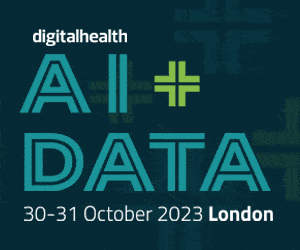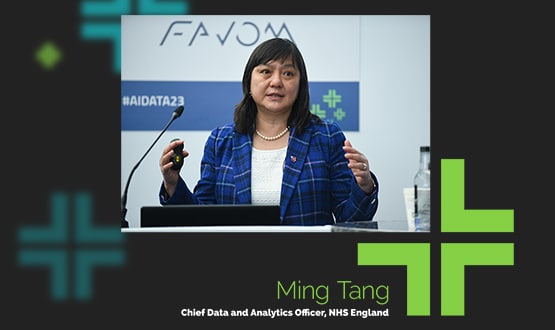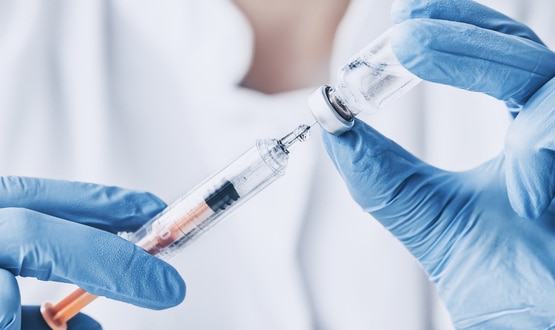Richard Scott highlights the role AI plays in the work of Genomics England
- 26 October 2023

Richard Scott, chief medical officer, acting CEO and soon to be the new interim CEO of Genomics England, has delved deep into the work the organisation does and how AI fits in ahead of speaking at the inaugural Digital Health AI and Data next week.
Speaking to host Jordan Sollof on the Digital Health Unplugged podcast, Scott discussed his background and career to date and explained the work of Genomics England and the importance of AI before previewing his session at AI and Data on Monday 30 October.
Scott is a trained doctor by background but confirmed that he was “really into genetics” and “did a project on genetics and my third year scientific bit was very much focused on genetics.
“I didn’t know that I’d end up so immersed in it (genetics/genomics), it was just one of those things that captured my imagination,” he said. He eventually specialised in genomics and is now a clinical genetics consultant at Great Ormond Street.
Whilst doing his PhD, “next generation sequencing, so the explosion in terms of our capabilities to generate sequence data at scale, happened and I realised that actually, it was coming to prime time in terms of this being something that you could really use at scale in the health service,” Scott said.
The UK Government spotted the same thing and in 2012 then PM David Cameron announced the 100,000 Genomes Project. In 2013 Genomics England was formed. Scott joined the organisation in 2015 as an expert on rare disease diagnostics.
The work of Genomics England
Genomics England, a company owned by the UK government’s Department of Health and Social Care, was set up first to deliver the 100,000 Genomes Project. The research study aimed to discover the value of whole genome sequencing in the diagnostic setting in routine care and determine its value for research.
The organisation has evolved since then, thanks to the project and continual investment from the government. The NHS is “the first health system in the world to offer whole genome sequencing routinely as a diagnostic test, and we Genomics England provide a service to the NHS to enable the sequencing and the data analytics component of that service,” Scott said.
Genomics England are also working on several other big projects, including the Newborn Genomes Programme, in which Scott is heavily involved. The vision of the project is to deliver a generation study to sequence the genomes of 100,000 newborns to look for a specific set of rare genetic conditions that affect babies and can be acted on.

In March, the organisation also completed the installation of Sectra’s enerprise imaging system, which will support the world’s largest multimodal cancer research platform.
The role of AI
Scott said AI, with its accompanying waves of technological change, new sequencing, high performance computing capabilities and storage capabilities had driven many of his personal career choices.
“We see new genomic targeted therapies coming as another wave and AI I think is a sort of wave on its own which alone would be remarkable,” he said. When combined with changes in the world of genomics and healthcare more broadly, AI might not be a “silver bullet that completely changes everything we do and turn it on its head but it’s a tool that we can use to address really important questions for us.”
Genomics England, Scott added, is “really well placed to enable the research and discovery into what role AI can play to help train algorithms and also to learn where it adds the most value”.
As an example, he suggested that when researchers are thinking about how to interpret clinical data that might help them understand variation in the genome for someone, AI and machine learning methods could be used to look across clinical data and do that in an automated fashion, rather than manually.
Scott likened AI to a “co-pilot” that could work alongside clinical scientists to reduce the amount of time they have to spend per case and – in some cases – increase automation. “That’s an enormously powerful thing for us and will help us be able to scale the power of genomics, where at the moment we’re using it in a certain set of settings in healthcare.
“As evidence emerges in the coming years, we can see the breadth of potential use of genomics really expanding and AI is going to be really important in enabling us to make that possible to allow that scale,” Scott added.
A look ahead to next week’s AI and Data session
The inaugural Digital Health AI and Data conference will take place 30-31 October at the Business Design Centre in London. Registration is available here.
Scott will be an opening keynote speaker alongside Dr Claire Bloomfield of NHS England. “I’m really excited about the programme and the session,” he said. “I’ll be speaking alongside Claire Bloomfield and one of the things that Claire and I have been talking about in advance of the session is about engagement and really understanding what it is that we’re trying to drive and the benefits at a societal level and what it is we’re collectively shooting for.”
He added: “One of the other themes that we think will come out in our joint discussion is about real care about the quality of the data, so that the predictions and the learning that we can make are really trustworthy, rather than sort of seeing the biases in the data.
“So if you generate an image, using one system or another in a different part of the country, you can understand that the differences that you’re seeing in outcomes are not related to geography, they’re related to the biology and for us in genomics, being really careful about making sure that the data is coherent nationally and comparable.”
The session featuring Scott and Bloomfield, titled ‘Keynote: transforming healthcare through data and research’, will take place on Day One of the event at 9.30am on the Data and Research Stage.
The full episode of Digital Health Unplugged: Genomics England and the role of AI, featuring Scott will be released later today (26 October) on Spotify, Apple Podcasts and many of your other favourite podcast platforms.
You can also download the podcast from digitalhealth.podbean.com or through the Podbean app.




